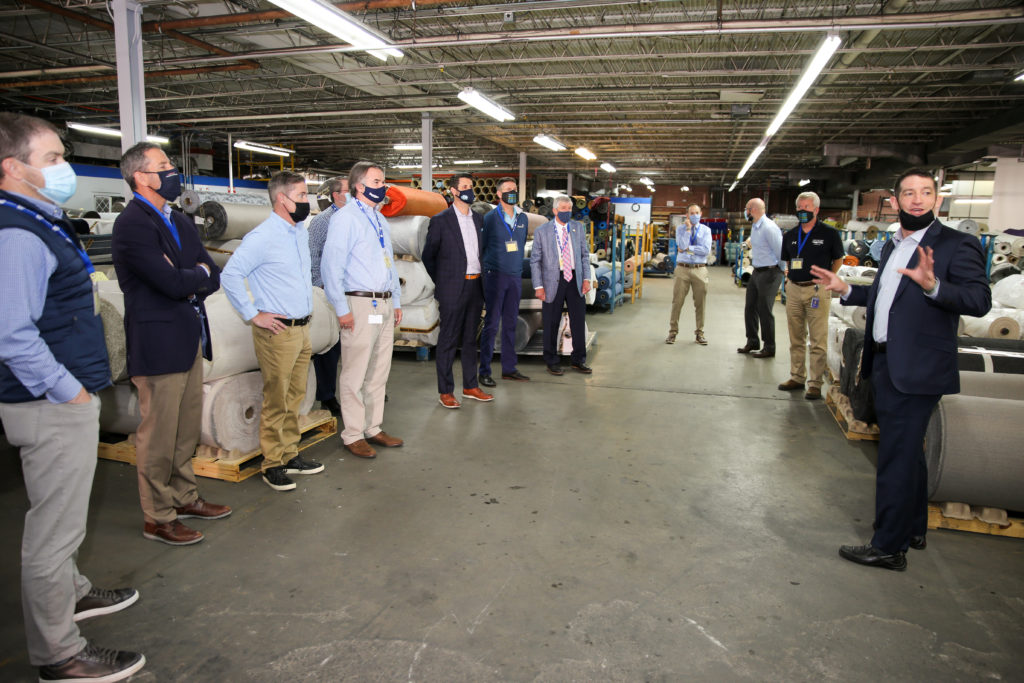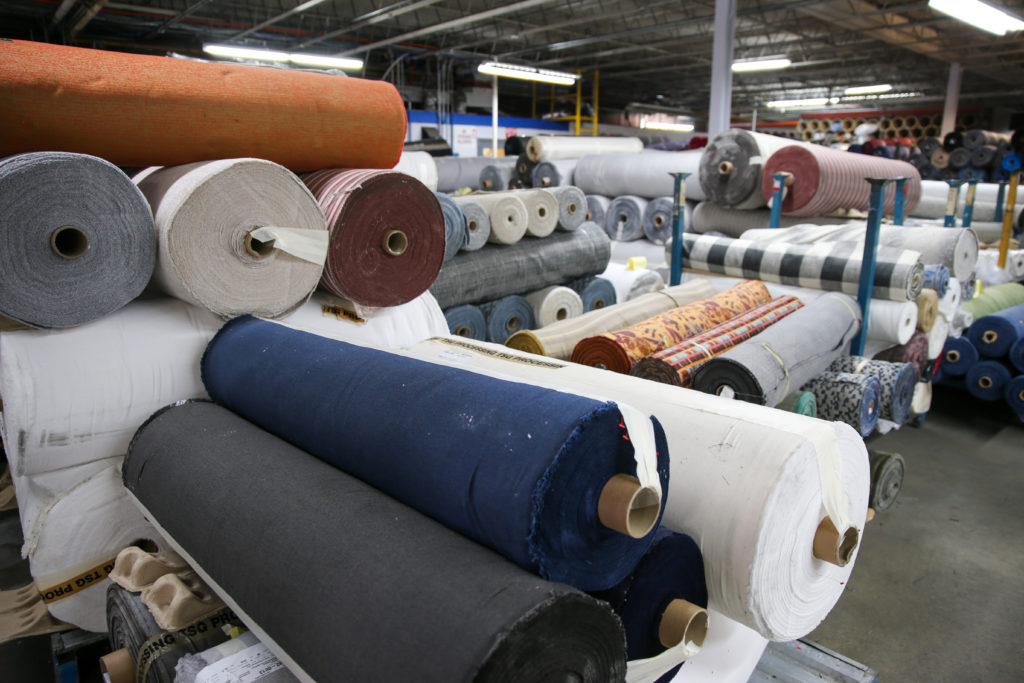By Devin Steele
HICKORY, N.C. – Brian Rosenstein, CEO of TSG Finishing and fifth-generation owner to run the 120-year-old company, called his father Jack last week to ask if he remembers a time during his 50-plus-year career with the firm when a dire labor shortage existed.
His father answered no, recalled the younger Rosenstein, who joined the textile finisher full time in 1995. But today, TSG Finishing—as businesses in many sectors these days—finds itself with a humongous challenge: hiring and retaining enough employees to keep up with customer demand as the COVID-19 pandemic wanes and to fuel growth.
TSG is currently utilizing only about 40 percent of capacity, and if it had all the labor needed to match its volume, that number would immediately jump to 75 percent, Rosenstein said. And the corporate goal is 90 percent capacity utilization by the end of the year, which isn’t possible in the current labor environment, he added.
“Since joining the company, one of my proudest things I’ve been able to say to customers is to ‘throw volume at us. You can never choke us with too much volume.’ And I was batting a thousand until 2021.”
After trying creative ways to attract people, including incentives (to little avail so far), Rosenstein and his cousin Michael Goldman, company president, decided it was time to take the issue to a larger audience that may be able to help drive better solutions. So, they invited local, state and federal officials to its Synthetics Plant – one of three it operates in the Hickory area – for a plant tour and a discussion about the labor shortage.
On May 7, they covered the issue in depth with N.C. State Senator Dean Proctor (R-42), a representative of U.S. Rep. Patrick McHenry’s Office (in person), a representative of U.S. Senator Thom Tillis’ Office (via phone) and several local leaders. And with the challenge affecting all in the region, they also brought in some of their customers and industry colleagues, including Blake Millinor, president of Valdese Weavers; Vuk Trivanovic, CEO of Shurtape Technologies; and Brandon Hucks, CFO of Century Furniture.
“It was a very interesting meeting, and we learned information that was somewhat eye-opening for us,” Rosenstein said, explaining some of the cause-and-effect factors from the local level – a housing shortage in Catawba County, for instance – beyond the obvious reasons employees are difficult to find these days. “The overarching ambition for us was to see if a study could be conducted to find out once and for all why unemployment is so high in order to help solve this issue. While we all agreed that unemployment insurance from the stimulus program is at the top of the list, it is in no way the only item on the list. There are other factors at play here and those other factors can be more easily dealt with.”
He added: “Let’s be honest. I was not expecting to come out of that meeting with the secret sauce of how to bring in 40 employees right away. I knew that wasn’t going to happen, but the action items for us was: You need to be a squeaky wheel, you need to stay in front of your public officials and legislatures and you have to keep sending the message to them of the importance of who you are, where you’re coming from and what your situation is because lawmakers and policymakers can be part of the solution.”

Being part of the solution
One of their messages to the federal reps was: As a military supplier and a 100 percent U.S.-based manufacturer, TSG Finishing benefits from policies such as the Berry Amendment and other buy-American legislation, he pointed out. Most recently, efforts to bring Personal Protective Equipment (PPE) manufacturing back to the U.S. through federal mandates are especially important, he added.
Among other solutions proposed: develop incentives for existing manufacturers to retain and hire more people, not just create more jobs; make Western Carolina a leader in attracting and settling immigrant or resettled refugee populations to supplement the workforce; support vaccination campaigns to combat vaccine hesitancy; increase qualification requirements for unemployment insurance; and make sure future stimulus programs are employer-based, similar to the Paycheck Protection Program (PPP).
Catawba County has added more than 1,000 jobs since January 2020, but the size of the workforce in the county has been in steady decline since 2000, Rosenstein noted.
And factoring in current turnover and fees for temp agencies, it costs TSG 50 percent more than normal to fill an open position, he added.
“We’ve been a long-time partner with,” Millinor said during a group introductory meeting that morning before the tour and closed-door meeting. “They’re ability to service our product is critical for our business, so we have a close relationship. Our customers, suppliers and partners are here, and we all face many of the same challenges.”
State Sen. Proctor, who lives in Hickory and was appointed to his position to fill a term last summer, said during the session that he hears a lot about the labor issue from constituents and is eager to do his part to address it.
“It’s something a lot of people are experiencing, so we all know what you’re going through,” said Sen. Proctor, a retired executive with a beverage wholesaler. “I think, ultimately, there are two solutions to this. One is cutting off federal money and the other I think is mandating a job requirement. If you apply for a job and are offered a job, it’s mandated that you take it, or the money gets cut off.”

Casting a wider net
It’s safe to say that every American and many people globally have touched or seen something that has run through a TSG Finishing plant, Rosenstein said. Beyond military, its technologies add numerous performance attributes to fabrics that go into multiple sectors, including apparel, construction, contract, filtration, healthcare, hospitality, marine, outdoor, residential and transportation – from Broadway to Big Sur.
“We’re the guy behind the guy behind the guy behind the guy,” said Rosenstein, who was born in Hickory and is now based at the company’s headquarters in Philadelphia. “You don’t think about what goes into that chair you sit on, what’s in that medical gown, what’s in the seat or the seatbelt of your car.”
He said that TSG’s 190 employees take a lot of pride in their work, and are happy to go beyond the call to get the job done. But they need help, he added. A number of them have been with the company more than 20 or 30 years, and some more than 40, he added, and most are working a lot of overtime to get product through the plants.
“While we have the ability to work on Sundays, our decision to close on Sundays is not a financial decision,” he said. “It’s a safety and wellbeing decision because we have to give everybody a break.”
While the situation is “infinitely” better than it was 12 months ago, with so much uncertainty and work hesitancy prevalent in the early days of the pandemic, a lot of effort needs to be taken before the company returns to “normal” times, Rosenstein said.
“Our goal after this meeting is for it to not to be a one and done,” he said. “We’re aiming to cast a wider net, and we’re already starting to make plans to reach out to other officials and play a more pivotal role in this situation, for our company, our community and our state. We definitely want to have a larger voice.”
 TEXTILES.ORG
TEXTILES.ORG


